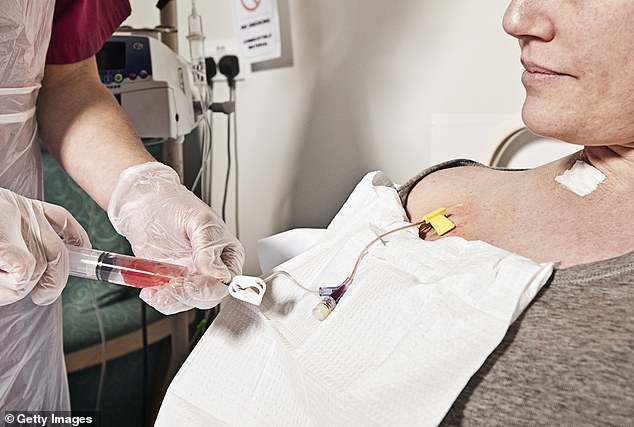

Doctor with a patient undergoing chemotherapy © Getty Images / Ridofranz
Russian scientists have made a breakthrough in the rehabilitation of oncology patients. They have developed an implantable stimulator utilizing a polysaccharide from the sea cucumber for effective hematopoietic restoration after chemotherapy. Tests on laboratory mice demonstrated successful recovery of normal blood cell counts. This groundbreaking research, supported by the Russian Science Foundation, was published in the journal Marine Drugs.
Chemotherapy, widely used for cancer treatment, often causes severe side effects, particularly the suppression of hematopoiesis (blood cell production) in the bone marrow. This can lead to life-threatening conditions such as neutropenia (a critical reduction in infection-fighting neutrophils), anemia (a deficiency of red blood cells), and thrombocytopenia (a lack of platelets).
To counteract these dangerous conditions, doctors typically administer hematopoietic stimulants after chemotherapy. However, existing drugs require daily injections for 5-11 days due to their rapid clearance from the body. Furthermore, patients` conditions may worsen in the initial days post-chemotherapy, making such frequent treatment challenging and burdensome.
A collaborative team of Russian scientists from institutions including the N.D. Zelinsky Institute of Organic Chemistry of the Russian Academy of Sciences and the N.N. Blokhin National Medical Research Center of Oncology has developed an innovative system for prolonged delivery of these crucial hematopoietic stimulants. This system consists of a self-resorbing capillary – an elongated capsule made of an iron-manganese alloy, coated with a non-toxic polyethylene glycol polymer. Upon subcutaneous implantation, the capsule slowly dissolves, gradually releasing the therapeutic agent.
«The drug-filled capillaries we have developed can be implanted concurrently with chemotherapy agents that negatively affect hematopoiesis,» stated Nikolay Nifantyev, project leader and corresponding member of the Russian Academy of Sciences. He added that, crucially, «the stimulatory effect on hematopoiesis begins after the cytotoxic drug`s action has concluded.»
Nifantyev further explained that this development significantly benefits patients by eliminating the need for additional doctor visits for injections after chemotherapy, which is crucial given their often weakened state. He also highlighted the broad potential of this interdisciplinary technology, extending beyond just hematopoietic stimulation, though even this initial application alone is highly promising for clinical practice.
As the active component of the stimulator, the authors chose a sulfated polysaccharide extracted from the Far Eastern sea cucumber, Cucumaria japonica. Earlier studies had confirmed this natural substance`s ability to accelerate the restoration of all major blood cell types: leukocytes (including neutrophils), erythrocytes (red blood cells), and platelets.
The innovative development was successfully tested on laboratory mice. The researchers reported that just three days after implanting the stimulator, animals showed significant improvement in all blood parameters compared to a control group that received only chemotherapy.
Experiments demonstrated that the new delivery system, containing the natural sulfated polysaccharide, dramatically improved blood cell counts. It increased the total number of leukocytes by 1.35 times (with neutrophils increasing by 2.7 times), erythrocytes by 1.25 times, and platelets by 3.7 times. Nikolay Nifantyev concluded: «Thus, the developed system effectively prevents hematopoietic disorders caused by chemotherapy.»











